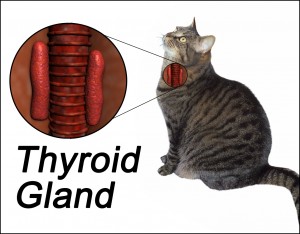Hi Krissy. Thyroid diseases in dogs and cats are pretty different so I think we’ll tackle them separately. Let’s start with the kitties.
The thyroid glands are located in the neck and produce a hormone (thyrotropin) which helps regulate your cat’s metabolic rate. Cats can develop a benign (non-cancerous) growth on one or both of these glands which causes them to overproduce thyrotropin and leads to hyperthyroidism. A small percentage of cats (1-2%) will have hyperthyroidism due to a malignant cancer called thyroid adenocarcinoma.
The signs of hyperthyroidism are caused by an increase in the metabolic rate because of the overproduction of thyrotropin. The most common symptoms are weight loss despite an excellent appetite, increased water intake, hyperactivity, diarrhea, vomiting, and vocalization. In some cats, listlessness and loss of appetite can also be seen. Because of the increase in metabolic activity, cats with thyroid disease can also develop heart abnormalities such as an elevated heart rate, abnormal rhythm, heart murmur, or heart enlargement. Your veterinarian may need to screen your cat for these changes as well at the time of diagnosis of hyperthyroidism.
A definitive diagnosis of hyperthyroidism is simple and will require taking a blood sample from your cat to measure the thyrotropin (T4) level. An elevation in the thyroid level beyond what is expected for your cat’s age is diagnostic of hyperthyroidism. In some instances, if a T4 level alone is not diagnostic and the disease is still suspected, your veterinarian may order more specialized thyroid testing. Other tests to check liver or kidney function will also be recommended at the time of thyroid screening to make sure that your cat doesn’t have any other illness that needs to be addressed.
There are 4 common ways to treat hyperthyroidism: diet, medication, radioactive iodine, and surgery. Which option is best for your cat will depend on their overall health or the presence of other problems. Medical management with a medication called methimazole is fairly common but requires giving g an oral medication daily for the rest of the cat’s life. If your cat is a candidate and the service is available in your area, radioactive iodine therapy can be curative. Your veterinarian can discuss all of these options with you in greater detail.
I hope this helps Krissy. Thanks for the question!





